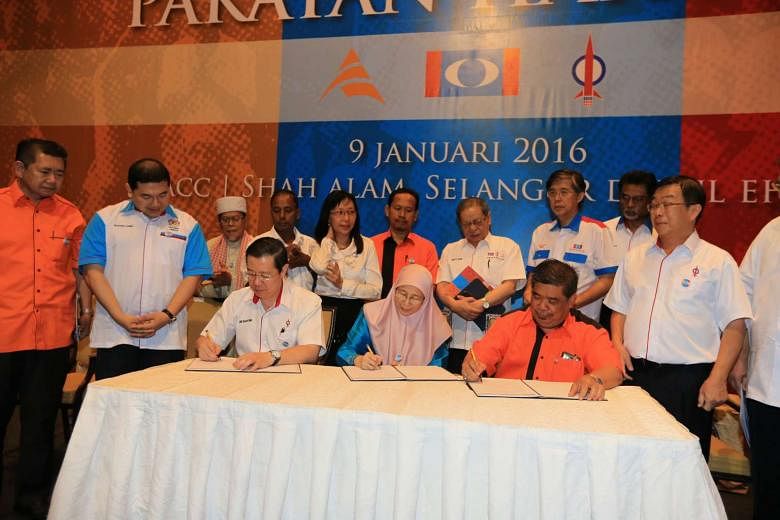SHAH ALAM - Malaysia's new opposition coalition Pakatan Harapan agreed on a code of conduct on Saturday (Jan 9) in a bid to avoid the loose "agree to disagree" framework that led to the break up of the old alliance that lasted just seven years and the estrangement of key Islamic party Parti Islam se-Malaysia (PAS).
Leaders of Parti Keadilan Rakyat (PKR), Democratic Action Party (DAP) and Amanah - a splinter from PAS - signed the Pakatan Harapan (PH), or Coalition of Hope, Agreement which outlines key internal workings on dispute settlement and ideology.
But they have yet to unveil joint policies to drive their quest to finally unseat the long-ruling Barisan Nasional (BN).
"When BN succeeded in burying Pakatan Rakyat (PR), they felt they were safe," said Mr Lim Guan Eng, secretary-general of the most powerful opposition party DAP. "But Pakatan Harapan is proving that it is the end of BN that is coming."
In their four-hour long inaugural congress, PH leaders focused on the 15-page document that centres on avoiding the damaging internal feuds that finally shattered PR last year despite being progressively closer to winning national elections.
However, they skirted controversial issues such as seat allocation for an election due in 2018 - a process that has become more complicated than before as PAS is not part of the alliance - and hudud, a set of Islamic criminal laws which caused intense friction between PAS and the secular DAP.
Such feuds over Islam and constant attacks from both Umno and PAS concerning Malay rights and Islamic issues have damaged the already weak support DAP holds with the crucial Malay majority.
Party stalwart and parliamentary leader Lim Kit Siang had on Friday cited a survey showing anti-DAP sentiment among Malays a "wake-up call" for the rank and file.
The Darul Ehsan Institute's Nov 2015 survey found that 72 percent of Malays in Selangor - a state DAP won in 2013 elections together with PKR and PAS - saw DAP as a pro-Chinese party and nearly two-thirds felt the party was anti-Malay and anti-Islam.
Amanah president Mohamad Sabu said PH "must not fall into their trap" of racial politics or "we can never escape the BN regime".
According to the PH Agreement, all policies and decision must be unanimously agreed by the three parties and any disputes will be settled internally via a Mediation Board to avoid the public bickering that had eroded confidence in the opposition's ability to eventually form a stable government.


